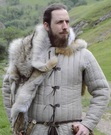Rob J. Hayes's Blog, page 24
October 1, 2015
Review Blog: Seth Skorkowsky's Sea of Quills
One line review: Hello old friend, chase, sexy time, YARR!, sexy time, homicidal cephalopods, bounty hunter, homicidal anguilliformes, cylons, gruesome death, bounty hunter, not so captured after all.
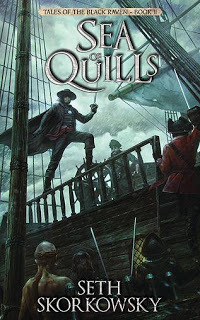
In the same vein as the first in the series, Mountain of Daggers, this book is a collection of short tales all revolving around the central character of Ahren, the Black Raven, a master thief and assassin working for a criminal organisation that spans the world. Seth builds on the world he created in the first book, with more details, new details, a host of crazy fantastical creatures, and more heists.
The meticulous planning that has obviously gone into writing the heists is again the high point of this book. Nothing goes to waste and it's always fun to see how the Black Raven is going to pull them off.
We get a bunch of new characters and a few returning from the first book. The highlight there for me was the returning Polnoch, Ahren's nemesis of sorts and also his eternal love interest. The interplay between the two is a lot of fun to read.
Ahren felt a little more fleshed out in this collection, but still his character seemed flat a lot of the time. There simply doesn't seem to be much going on inside Ahren's head. He has a job, he does it. Complications arise, he overcomes them. He sleeps with a woman and then watches her die five minutes later, he doesn't feel anything one way or the other about it. I'd have liked to see some more emotion from our main character.
Mountain of Daggers had a core story running through it. The book was about the Black Raven's 'birth', but three of the stories were devoted to a single villain, including the last story which ended on a cliffhanger. There was no core story running through Sea of Quills and the cliffhanger from the first volume was never eluded to. In that I was slightly disappointed. While I do like each story being self-contained, I'd like there to be a reason for following along with Ahren. I'd like to know the stories are headed somewhere.
Overall I really enjoyed Sea of Quills and happily give it a solid 3.75 stars, but I always round up so the Black Raven's second outing earns 4 glorious stars. I'm almost certain there will be another volume on its way and I eagerly look forward to it.
Amazon UK link to Sea of Quills
Amazon US link to Sea of Quills

In the same vein as the first in the series, Mountain of Daggers, this book is a collection of short tales all revolving around the central character of Ahren, the Black Raven, a master thief and assassin working for a criminal organisation that spans the world. Seth builds on the world he created in the first book, with more details, new details, a host of crazy fantastical creatures, and more heists.
The meticulous planning that has obviously gone into writing the heists is again the high point of this book. Nothing goes to waste and it's always fun to see how the Black Raven is going to pull them off.
We get a bunch of new characters and a few returning from the first book. The highlight there for me was the returning Polnoch, Ahren's nemesis of sorts and also his eternal love interest. The interplay between the two is a lot of fun to read.
Ahren felt a little more fleshed out in this collection, but still his character seemed flat a lot of the time. There simply doesn't seem to be much going on inside Ahren's head. He has a job, he does it. Complications arise, he overcomes them. He sleeps with a woman and then watches her die five minutes later, he doesn't feel anything one way or the other about it. I'd have liked to see some more emotion from our main character.
Mountain of Daggers had a core story running through it. The book was about the Black Raven's 'birth', but three of the stories were devoted to a single villain, including the last story which ended on a cliffhanger. There was no core story running through Sea of Quills and the cliffhanger from the first volume was never eluded to. In that I was slightly disappointed. While I do like each story being self-contained, I'd like there to be a reason for following along with Ahren. I'd like to know the stories are headed somewhere.
Overall I really enjoyed Sea of Quills and happily give it a solid 3.75 stars, but I always round up so the Black Raven's second outing earns 4 glorious stars. I'm almost certain there will be another volume on its way and I eagerly look forward to it.
Amazon UK link to Sea of Quills
Amazon US link to Sea of Quills
Published on October 01, 2015 04:38
September 25, 2015
Modern Epic Fantasy – The (Super) Hero's Journey
I was playing Dungeons & Dragons (D&D) a while back and our Games Master (GM) looked up from his book and sighed at us. He pointed out that playing D&D basically puts the players in the shoes of super heroes in a fantasy setting. We were monstrous and taking down monsters and he (the GM) was finding it all a bit dull. It got me thinking. How much of modern epic fantasy is actually a bit like that?
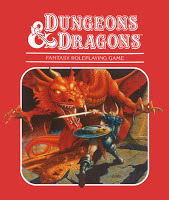
We probably all know the hero's journey by now, but if we don't, here's a quick recap.
It's pretty well-known by this point and pretty well-accepted as a good basis for many a story. But is the hero's journey becoming more about the super-hero's journey in modern epic fantasy?
There was always a degree of it. Some farm boy/girl finds out they're the chosen one, goes on some epic quest, finds a powerful artefact/unlocks their hidden potential, comes back to crush the evil dark lord. Sure. But these days are our heroes a little bit TOO powerful after they come back to crush said evil dark lord?
I'm gonna drop some spoilers here and some names. I would like to point out that I am in no way disparaging any of these authors or their works... apart from Patrick Rothuss because fuck Kvothe in his smug, self-righteous face.
In Brandon Sanderson's Mistborn trilogy we see Vin go from orphaned street urchin with the power to cower from her enemies, to full-blown apocalypse in human form. By the end of the trilogy she is swinging through the streets like Spiderman and crushing people like the Hulk. Definitely not just a hero, Vin is a super-hero.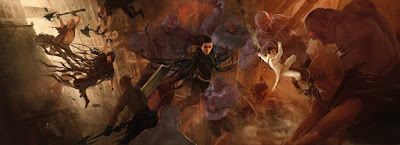 (Image: Mistborn by Marc Simonetti)
(Image: Mistborn by Marc Simonetti)
In Brent Week's Night Angel trilogy we see Kylar go from (this might sound familiar) orphaned street urchin, to racing through an army cutting a swath through his enemies. He bonds with a sort of magical metal which can cover his body and... well basically it gives him superpowers... sounds a bit like Venom... and works a bit like Venom. Kylar definitely is a super-hero.
In Patrick Rothuss' Kingkiller Chronicles we see Kvothe (smug little, pretentious shit that he is) orphaned and start life as a street urchin... yeah it happens again. Now the story is still ongoing but already we can see that Kvothe is developing superpowers and is pretty much already better than everyone at everything (that would be the crux of my issue with him). Kvothe is a super-hero.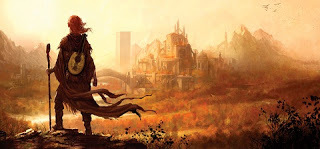 (Image: Name of the Wind by Marc Simonetti)
(Image: Name of the Wind by Marc Simonetti)
In Raymond E. Feist's Riftwar Saga we see not one but two orphans, Pug and Tomas. One grows up to be a god and the other grows up to be a mage with powers that pretty much make him a god. They are both super-heroes.
I could keep going. I won't because then it just turns into a list, but I could... trust me. You can probably already see a pattern forming here and it likely looks familiar to you. We see it in comics the world over. Orphaned child grows up and develops/awakens super powers to beat the big bad.
But epic fantasy wasn't (and isn't) always like this.
J.R.R.Tolkien's Lord of the Rings and the Hobbit both centred around a hobbits who never developed anything approaching super powers. In fact in the whole series the only character who could be called super-hero like (at least character who really participates) is Gandalf and... well he never really uses magic in that way... in fact I barely remember using magic at all... apart from to summon the bloody eagles. Neither Bilbo, nor Frodo were super-heroes.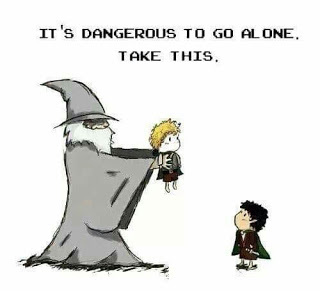
In Joe Abercrombie's First Law trilogy we follow Logan, Jezal, Ferro, and Glokta and none of them have super-powers... well maybe Ferro did, but it was never really explained. Bayaz might have had something approaching super-powers, but he was a background player. None of the major characters were super-heroes.
In Scott Lynche's Gentlemen Bastards we follow the exploits of Jean and Locke as they attempt to rob everyone of everything because of reasons. Jean is a dab hand with a hatchet or a fist and Locke is fast as a whip and smarter than pin-stripe suit, but that's as far as it goes. Neither Jean, nor Locke are super-heroes... though Locke is an orphan street urchin.
Now all of these are books I've enjoyed, even the Kingkiller Chronicles (though that's more to do with Rothuss' lyric-like prose and less to do with his annoying, shit-faced characters), but I find myself leaning more towards the non-super-hero books when I try to decide which I liked more.
It's also made me look at my own works and I realise that ten years ago I used to write stories about characters who were, or became, super-heroes. But these days I tend to write more about characters becoming heroes and overcoming odds, but doing it without superpowers.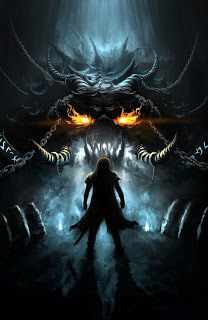 (Image: The Heresy Within by Sigbjorn Pederson)
(Image: The Heresy Within by Sigbjorn Pederson)
I think all too often I find myself in a similar position to my D&D group's GM. Once the character in a story reaches the pinnacle of their powers, I find myself detaching from them and becoming a little bit bored with the whole affair. Either the big bad gets crushed because the hero has too much power, or the big bad powers up to his final form and they fight and its all just Michael Bay explosions on a page until the hero eventually wins.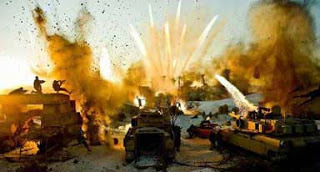
So let's not forget that stories can be heroic, and characters can be heroes, without being about superpowers. Also, modern epic fantasy needs more dragons.
Rob J. Hayes is the author of the acclaimed The Ties that Bind trilogy. Find out more on his website here.

We probably all know the hero's journey by now, but if we don't, here's a quick recap.

It's pretty well-known by this point and pretty well-accepted as a good basis for many a story. But is the hero's journey becoming more about the super-hero's journey in modern epic fantasy?
There was always a degree of it. Some farm boy/girl finds out they're the chosen one, goes on some epic quest, finds a powerful artefact/unlocks their hidden potential, comes back to crush the evil dark lord. Sure. But these days are our heroes a little bit TOO powerful after they come back to crush said evil dark lord?
I'm gonna drop some spoilers here and some names. I would like to point out that I am in no way disparaging any of these authors or their works... apart from Patrick Rothuss because fuck Kvothe in his smug, self-righteous face.
In Brandon Sanderson's Mistborn trilogy we see Vin go from orphaned street urchin with the power to cower from her enemies, to full-blown apocalypse in human form. By the end of the trilogy she is swinging through the streets like Spiderman and crushing people like the Hulk. Definitely not just a hero, Vin is a super-hero.
 (Image: Mistborn by Marc Simonetti)
(Image: Mistborn by Marc Simonetti)In Brent Week's Night Angel trilogy we see Kylar go from (this might sound familiar) orphaned street urchin, to racing through an army cutting a swath through his enemies. He bonds with a sort of magical metal which can cover his body and... well basically it gives him superpowers... sounds a bit like Venom... and works a bit like Venom. Kylar definitely is a super-hero.
In Patrick Rothuss' Kingkiller Chronicles we see Kvothe (smug little, pretentious shit that he is) orphaned and start life as a street urchin... yeah it happens again. Now the story is still ongoing but already we can see that Kvothe is developing superpowers and is pretty much already better than everyone at everything (that would be the crux of my issue with him). Kvothe is a super-hero.
 (Image: Name of the Wind by Marc Simonetti)
(Image: Name of the Wind by Marc Simonetti)In Raymond E. Feist's Riftwar Saga we see not one but two orphans, Pug and Tomas. One grows up to be a god and the other grows up to be a mage with powers that pretty much make him a god. They are both super-heroes.
I could keep going. I won't because then it just turns into a list, but I could... trust me. You can probably already see a pattern forming here and it likely looks familiar to you. We see it in comics the world over. Orphaned child grows up and develops/awakens super powers to beat the big bad.
But epic fantasy wasn't (and isn't) always like this.
J.R.R.Tolkien's Lord of the Rings and the Hobbit both centred around a hobbits who never developed anything approaching super powers. In fact in the whole series the only character who could be called super-hero like (at least character who really participates) is Gandalf and... well he never really uses magic in that way... in fact I barely remember using magic at all... apart from to summon the bloody eagles. Neither Bilbo, nor Frodo were super-heroes.

In Joe Abercrombie's First Law trilogy we follow Logan, Jezal, Ferro, and Glokta and none of them have super-powers... well maybe Ferro did, but it was never really explained. Bayaz might have had something approaching super-powers, but he was a background player. None of the major characters were super-heroes.
In Scott Lynche's Gentlemen Bastards we follow the exploits of Jean and Locke as they attempt to rob everyone of everything because of reasons. Jean is a dab hand with a hatchet or a fist and Locke is fast as a whip and smarter than pin-stripe suit, but that's as far as it goes. Neither Jean, nor Locke are super-heroes... though Locke is an orphan street urchin.
Now all of these are books I've enjoyed, even the Kingkiller Chronicles (though that's more to do with Rothuss' lyric-like prose and less to do with his annoying, shit-faced characters), but I find myself leaning more towards the non-super-hero books when I try to decide which I liked more.
It's also made me look at my own works and I realise that ten years ago I used to write stories about characters who were, or became, super-heroes. But these days I tend to write more about characters becoming heroes and overcoming odds, but doing it without superpowers.
 (Image: The Heresy Within by Sigbjorn Pederson)
(Image: The Heresy Within by Sigbjorn Pederson)I think all too often I find myself in a similar position to my D&D group's GM. Once the character in a story reaches the pinnacle of their powers, I find myself detaching from them and becoming a little bit bored with the whole affair. Either the big bad gets crushed because the hero has too much power, or the big bad powers up to his final form and they fight and its all just Michael Bay explosions on a page until the hero eventually wins.

So let's not forget that stories can be heroic, and characters can be heroes, without being about superpowers. Also, modern epic fantasy needs more dragons.
Rob J. Hayes is the author of the acclaimed The Ties that Bind trilogy. Find out more on his website here.
Published on September 25, 2015 06:28
September 21, 2015
Review Post: Seth Skorkowsky's Mountain of Daggers
One Line Review: Medallion ex machina, training, sneaky sneaky, big bad, sexy time, duel... sort of, getting to know you, return of the big bad, melancholia, sexy time, REALLY NOT SEXY TIME, cliffhanger.
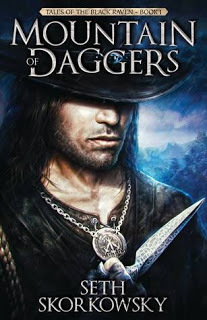
So I raced through this one which should give you all a good idea of how much I enjoyed it. Seth writes a good pulp-fantasy yarn and adds in a fair amount of detail. The heists were a joy to read and if you like Scott Lynch's Gentlemen Bastards, you'll love the Black Raven's exploits in Mountain of Daggers.
The book plays out like a series of short stories set along a time-line. We see Ahren at the birth of the Black Raven (his alias), and also during some of the major events/heists of his life leading up to the end (this isn't really the end as there is more to come). Each story, and chapter, is self-contained. This makes it hard to put down mid-chapter, but there are few hooks that make you HAVE to read the next chapter right away.
The world is very well-realised and Seth has obviously put a lot of effort into giving the major cities and land marks their own flavour. Unfortunately, as the stories move along at a fairly break-neck pace, we don't get to spend as much time in some of the cities as I'd have liked as the Black Raven is always flying off to a new part of the world.
My only real criticism is of Ahren himself. The Black Raven often comes across as a flat character being propelled through the stories while his supporting cast often seem to have a lot more personality.
With the next book in the series, Sea of Quills, coming out very soon (Sept 28th) I'm glad I picked this one up as I can't wait to continue the adventure.
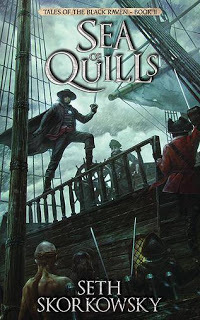
Mountain of Daggers gets a solid 4 stars and earns each and every one of them.
Amazon UK link to Mountain of Daggers
Amazon US link to Mountain of Daggers

So I raced through this one which should give you all a good idea of how much I enjoyed it. Seth writes a good pulp-fantasy yarn and adds in a fair amount of detail. The heists were a joy to read and if you like Scott Lynch's Gentlemen Bastards, you'll love the Black Raven's exploits in Mountain of Daggers.
The book plays out like a series of short stories set along a time-line. We see Ahren at the birth of the Black Raven (his alias), and also during some of the major events/heists of his life leading up to the end (this isn't really the end as there is more to come). Each story, and chapter, is self-contained. This makes it hard to put down mid-chapter, but there are few hooks that make you HAVE to read the next chapter right away.
The world is very well-realised and Seth has obviously put a lot of effort into giving the major cities and land marks their own flavour. Unfortunately, as the stories move along at a fairly break-neck pace, we don't get to spend as much time in some of the cities as I'd have liked as the Black Raven is always flying off to a new part of the world.
My only real criticism is of Ahren himself. The Black Raven often comes across as a flat character being propelled through the stories while his supporting cast often seem to have a lot more personality.
With the next book in the series, Sea of Quills, coming out very soon (Sept 28th) I'm glad I picked this one up as I can't wait to continue the adventure.

Mountain of Daggers gets a solid 4 stars and earns each and every one of them.
Amazon UK link to Mountain of Daggers
Amazon US link to Mountain of Daggers
Published on September 21, 2015 03:36
August 20, 2015
Raising Your Book
I've seen a few things on twitter and facebook recently about the author cycle of woe. For those of you who don't know it's an author thing where you start off loving the thing you're creating, then hate it, then love, then hate it, then... it just goes on for a bit.
I'm pretty sure most authors go through the same thing too. When you dedicate so much of your life to creating and raising a thing, you inevitably want some time away from it occasionally. You want some time to yourself where you're not considering how a plot development makes no sense, or how a character is going to pop up in one place after being beheaded in another.
It dawned on me that cycle might be a lot like having a child:
At conception stages you have this idea and it seems so new and wonderful and it has the potential to be anything and it's so fun dreaming about it.
As time goes on and it become bigger and more fleshed out in your head, you start to just wish it was here already rather than still a concept.
Once it starts being down on paper it finally starts to feel real and you love it with all your heart. You wonder at its complexity and hope it will turn out how you dreamed it would. You tell everyone about it and can't wait for them, and you, to see what it will turn into.
Then the book starts asking questions. Relentlessly asking questions. It's still growing and it's taking you down paths you couldn't have foreseen and asking stupid questions like “why is something happening?” and “how does magic work?”. Not to mention the shit. For every 10 words you feed into the bloody thing, you find yourself deleting at least 3 of them.
Eventually it passes out of that oh so annoying phase and into something that you truly enjoy, something you find it fun to be around and want to play with, want to show new things to. Maybe you even show it off a bit to a few friends and they say they love it. Definitely coming along well at this point but it keeps waking you up in the middle of the night with its needs.
Then it heads off to school and for a while you find yourself at peace... I think the metaphor just collapsed a bit here. But the problem is that now it thinks it knows everything. You want to add a new plot into the book, but it already knows better and thinks you're wrong because its friend's dad does thing a different way. Bear with me, we only lost a little cohesion there.
The book hits high school and you almost think you're done with the bastard thing. It's a smarmy cock of a book these days but hopefully the editor will straighten it out.
That first school report is a bit much though. The editor calls you in and tells you your book is pretty good at English, but its failing Science hard. To top it off it keeps staring out the window and day dreaming instead of getting to the actual plot. Maybe you even get told that your book is a bad influence on the other books and thinks it's smarter than it actually is, constantly telling jokes no one else gets... Maybe my school reports just looked a little differently from others.
Over the course of its teenage years the books goes through many rewrites. Constantly having to be put down and told to shut up, maybe even sent to its room a few times. You hate it. You love it because it's yours, but you hate it because it's bloody obnoxious and it's devoured your life for so damned long... and it keeps getting in trouble with the editor.
Then finally. FINALLY! It finishes education and gets released into the real world. It's sink or swim now and you can only hope it swims. Not everyone likes it and that's to be expected, but you're proud of what you've created and you love it with all your heart... even if it does keep coming back and telling you you used “spun” instead of “span”.
Rob J. Hayes is the author of the acclaimed The Ties that Bind trilogy. Find out more on his website here.
I'm pretty sure most authors go through the same thing too. When you dedicate so much of your life to creating and raising a thing, you inevitably want some time away from it occasionally. You want some time to yourself where you're not considering how a plot development makes no sense, or how a character is going to pop up in one place after being beheaded in another.
It dawned on me that cycle might be a lot like having a child:
At conception stages you have this idea and it seems so new and wonderful and it has the potential to be anything and it's so fun dreaming about it.
As time goes on and it become bigger and more fleshed out in your head, you start to just wish it was here already rather than still a concept.
Once it starts being down on paper it finally starts to feel real and you love it with all your heart. You wonder at its complexity and hope it will turn out how you dreamed it would. You tell everyone about it and can't wait for them, and you, to see what it will turn into.
Then the book starts asking questions. Relentlessly asking questions. It's still growing and it's taking you down paths you couldn't have foreseen and asking stupid questions like “why is something happening?” and “how does magic work?”. Not to mention the shit. For every 10 words you feed into the bloody thing, you find yourself deleting at least 3 of them.
Eventually it passes out of that oh so annoying phase and into something that you truly enjoy, something you find it fun to be around and want to play with, want to show new things to. Maybe you even show it off a bit to a few friends and they say they love it. Definitely coming along well at this point but it keeps waking you up in the middle of the night with its needs.
Then it heads off to school and for a while you find yourself at peace... I think the metaphor just collapsed a bit here. But the problem is that now it thinks it knows everything. You want to add a new plot into the book, but it already knows better and thinks you're wrong because its friend's dad does thing a different way. Bear with me, we only lost a little cohesion there.
The book hits high school and you almost think you're done with the bastard thing. It's a smarmy cock of a book these days but hopefully the editor will straighten it out.
That first school report is a bit much though. The editor calls you in and tells you your book is pretty good at English, but its failing Science hard. To top it off it keeps staring out the window and day dreaming instead of getting to the actual plot. Maybe you even get told that your book is a bad influence on the other books and thinks it's smarter than it actually is, constantly telling jokes no one else gets... Maybe my school reports just looked a little differently from others.
Over the course of its teenage years the books goes through many rewrites. Constantly having to be put down and told to shut up, maybe even sent to its room a few times. You hate it. You love it because it's yours, but you hate it because it's bloody obnoxious and it's devoured your life for so damned long... and it keeps getting in trouble with the editor.
Then finally. FINALLY! It finishes education and gets released into the real world. It's sink or swim now and you can only hope it swims. Not everyone likes it and that's to be expected, but you're proud of what you've created and you love it with all your heart... even if it does keep coming back and telling you you used “spun” instead of “span”.
Rob J. Hayes is the author of the acclaimed The Ties that Bind trilogy. Find out more on his website here.
Published on August 20, 2015 07:55
July 1, 2015
Review Blog: The Legend of Korra
With the internet as full of negativity as it is I thought I'd break my own mould (yes, I have been known to be negative) and write a review about something I love. It also just so happens that I finished watching the Legend of Korra last night. Spoiler alert: I loved it. I'll try to keep the review as actual spoiler free as I can.
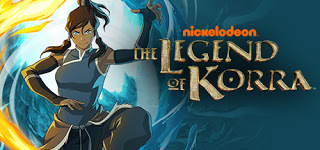
So for anyone who doesn't know. The Legend of Korra is set in a world where people can bend (control) the elements. In each generation the Avatar (who can control all four elements is resurrected into a new life). It is a direct follow on from Avatar: The Last Airbender, after a passage of half a century or so. In that time technology has started to flourish and so along with the Benders there are now cars, mech suits, radios and all sorts of other things. At this point anyone who has read IT TAKES A THIEF TO CATCH A SUNRISE can probably see why I love this world.
I'll jump straight into a bit about the main characters. Korra is the new Avatar. She is a headstrong, feisty young woman who is quick to jump into fights and, at the start at least, likes to solve all her problems with a fist and the fire that spurts forth. Honestly, after watching A LOT of anime, Korra is one of the biggest breaths of fresh air I've seen in a very long time. She's expertly conceived both in her personality and also appearance. Korra is shorter than some women her age, but stockier with a muscular form that suits not only her calling as the Avatar, but also her own take on being the Avatar (she likes to fight).
Korra comes across as both independent, strong, and at times vulnerable. She's a natural leader and people take heed when she takes command (and not just because she's the Avatar), and she learns to ask for help when it's needed as well. Her progression throughout the 4 series is a delight to watch and also touches on some very hard issues such as Post-Traumatic-Stress-Disorder (PTSD). I know I'm sounding a bit SQUEEE at this point, but that's because of how impressed I am by Korra's character. She is brilliantly designed, drawn, voiced, and projected throughout the series.
Asami is another strong female character though very different to Korra. She's the daughter of a man who owns a company on the forefront of technological progression, and as such she comes from privilege, though she isn't the sort of character to guard it. It turns out Asami inherited her father's ingenuity and she often comes up with the new tech to help save the day. She's also a combat specialist the likes of which I wish we had seen more of.
This is where I feel the problem with Asami enters in, she was often underused (actually it's a problem with many characters and I'll get to that later). So many times during the series I'd find myself thinking “Just let Asami loose and watch the bad guys drop like flies”, but more regularly she was relegated to driving/flying the others around.
We'll finish off with Mako and Bolin. Two orphan brothers who grew up on the streets and became professional-benders (bending for sport). Mako can bend fire, while Bolin can bend earth.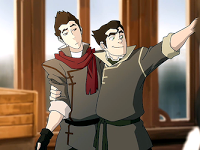
Mako is very much the straight man and in the early series this grates. He's just a bit dull and “too cool”. Luckily as the series go on his straight man routine becomes very rigid and that actually serves to make him more human as you realise he's actually quite awkward around people and hides it by being so proper.
Bolin is almost as opposite to his brother as can be. He's comic relief at times and the heart of the story at other times, but at no point does it feel forced. Bolin is bright, but not particularly intelligent, and is the type of character to say whatever is in his head. He's a lot of fun and a character you can really rally behind when he shows his heroics.
There is also a huge list of radial characters and many of them are also expertly realised and played out. But this also brings to bear my biggest issue with the series as a whole. It is 4 series of 12 episodes (11 really in series 4) and there are A LOT of characters. Obviously we spend most of our time with Korra as she is rightly the focus. What this means, though, is that often the other characters get lost when we focus on more radial characters. There were large portions where I realised we hadn't seen Asami for a few episodes and she wasn't the only one. That being said, I'd loved to have seen more about the radial characters as well as they were a lot of fun. Basically I'd have just loved there to have been more.
With the antagonists we have an odd range of characters throughout the 4 series, but none seem to bring the same menace that Aman did in the 1stseries. He was a bit like Darth Vader in that he wore a mask, was near unstoppable, and was always coming for our protagonist. One thing I did quite like in series 3, however, was how the finale was turned on its head with everyone else coming together to save Korra instead of her winning the day herself.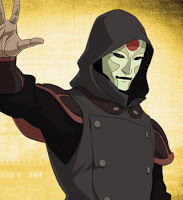
Overall I have to say I loved The Legend of Korra. It had some missteps but, like Avatar: The Last Airbender, it proves to be a wonderful story full of fully-realised characters, a wonderful world, and story-lines that tackle big, adult issues, while remaining full of hope.
OK. Lastly I want to talk briefly about the very end of the series. This will contain a spoiler, so stop reading if you don't want to know. SPOILER ALERT!
So right at the end we have Korra and Asami walking hand in hand into the spirit portal and then they stop and gaze into each other's eyes. We get the distinct impression that there is more than just friendship there. This is brilliant. I loved it as an added twist. My issue with it is that I didn't see it coming. It came out of left field. I would have loved to see a little more build up to it. Maybe I'll have to go back and watch the series again to see if there were little, subtle clues that I missed. I just wish we could have seen their relationship blossom a bit more.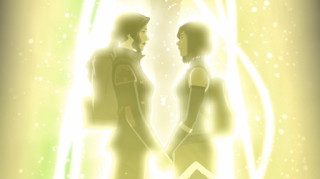
If you would like to read other blogs by Rob J. Hayes or read any of his stories, you can find more information at his website: www.robjhayes.co.uk

So for anyone who doesn't know. The Legend of Korra is set in a world where people can bend (control) the elements. In each generation the Avatar (who can control all four elements is resurrected into a new life). It is a direct follow on from Avatar: The Last Airbender, after a passage of half a century or so. In that time technology has started to flourish and so along with the Benders there are now cars, mech suits, radios and all sorts of other things. At this point anyone who has read IT TAKES A THIEF TO CATCH A SUNRISE can probably see why I love this world.
I'll jump straight into a bit about the main characters. Korra is the new Avatar. She is a headstrong, feisty young woman who is quick to jump into fights and, at the start at least, likes to solve all her problems with a fist and the fire that spurts forth. Honestly, after watching A LOT of anime, Korra is one of the biggest breaths of fresh air I've seen in a very long time. She's expertly conceived both in her personality and also appearance. Korra is shorter than some women her age, but stockier with a muscular form that suits not only her calling as the Avatar, but also her own take on being the Avatar (she likes to fight).
Korra comes across as both independent, strong, and at times vulnerable. She's a natural leader and people take heed when she takes command (and not just because she's the Avatar), and she learns to ask for help when it's needed as well. Her progression throughout the 4 series is a delight to watch and also touches on some very hard issues such as Post-Traumatic-Stress-Disorder (PTSD). I know I'm sounding a bit SQUEEE at this point, but that's because of how impressed I am by Korra's character. She is brilliantly designed, drawn, voiced, and projected throughout the series.
Asami is another strong female character though very different to Korra. She's the daughter of a man who owns a company on the forefront of technological progression, and as such she comes from privilege, though she isn't the sort of character to guard it. It turns out Asami inherited her father's ingenuity and she often comes up with the new tech to help save the day. She's also a combat specialist the likes of which I wish we had seen more of.
This is where I feel the problem with Asami enters in, she was often underused (actually it's a problem with many characters and I'll get to that later). So many times during the series I'd find myself thinking “Just let Asami loose and watch the bad guys drop like flies”, but more regularly she was relegated to driving/flying the others around.
We'll finish off with Mako and Bolin. Two orphan brothers who grew up on the streets and became professional-benders (bending for sport). Mako can bend fire, while Bolin can bend earth.

Mako is very much the straight man and in the early series this grates. He's just a bit dull and “too cool”. Luckily as the series go on his straight man routine becomes very rigid and that actually serves to make him more human as you realise he's actually quite awkward around people and hides it by being so proper.
Bolin is almost as opposite to his brother as can be. He's comic relief at times and the heart of the story at other times, but at no point does it feel forced. Bolin is bright, but not particularly intelligent, and is the type of character to say whatever is in his head. He's a lot of fun and a character you can really rally behind when he shows his heroics.
There is also a huge list of radial characters and many of them are also expertly realised and played out. But this also brings to bear my biggest issue with the series as a whole. It is 4 series of 12 episodes (11 really in series 4) and there are A LOT of characters. Obviously we spend most of our time with Korra as she is rightly the focus. What this means, though, is that often the other characters get lost when we focus on more radial characters. There were large portions where I realised we hadn't seen Asami for a few episodes and she wasn't the only one. That being said, I'd loved to have seen more about the radial characters as well as they were a lot of fun. Basically I'd have just loved there to have been more.
With the antagonists we have an odd range of characters throughout the 4 series, but none seem to bring the same menace that Aman did in the 1stseries. He was a bit like Darth Vader in that he wore a mask, was near unstoppable, and was always coming for our protagonist. One thing I did quite like in series 3, however, was how the finale was turned on its head with everyone else coming together to save Korra instead of her winning the day herself.

Overall I have to say I loved The Legend of Korra. It had some missteps but, like Avatar: The Last Airbender, it proves to be a wonderful story full of fully-realised characters, a wonderful world, and story-lines that tackle big, adult issues, while remaining full of hope.
OK. Lastly I want to talk briefly about the very end of the series. This will contain a spoiler, so stop reading if you don't want to know. SPOILER ALERT!
So right at the end we have Korra and Asami walking hand in hand into the spirit portal and then they stop and gaze into each other's eyes. We get the distinct impression that there is more than just friendship there. This is brilliant. I loved it as an added twist. My issue with it is that I didn't see it coming. It came out of left field. I would have loved to see a little more build up to it. Maybe I'll have to go back and watch the series again to see if there were little, subtle clues that I missed. I just wish we could have seen their relationship blossom a bit more.

If you would like to read other blogs by Rob J. Hayes or read any of his stories, you can find more information at his website: www.robjhayes.co.uk
Published on July 01, 2015 03:49
May 5, 2015
Inspiration
Someone recently asked me where my stories come from. I immediately replied with “from my misspent childhood.”. No one laughed. I quickly thought about coming up with a real answer and didn't think simply saying “my imagination” would cut it. I thought about all the things that have inspired me and affected the direction my work has taken.
I've always been a dreamer. At school I was that child who spent more time staring out the window than at a text book, and I still spend a lot of time staring out of windows (some real, some metaphorical). I watched films and TV shows, I read books (mostly fantasy and sci-fi), I played games (computer games, board/tabletop games), I ran around the forest with my friends pretending sticks were swords. It's all pretty standard as far as childhoods go, I guess.
When I was 13 or 14 I read a book series called The Artefacts of Power by Maggie Furey. I was blown away by the scope of the story, the depth of the characters, and the majesty of the world. It inspired me to give this whole writing crack a go. What I created back then was truly awful and I thank the Gods (which ever will listen) that they are lost for all time.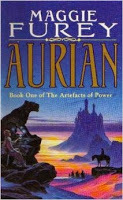 The series of a thousand covers.
The series of a thousand covers.
I spent a fair few of my teenage years dreaming about a world of vampires, werewolves, demons, and angels. A lot of this was probably down to my watching of Buffy and its spin off Angel. I'd like to stop right here and say a big “Thank you” to Joss Whedon for teaching me that dialogue can be a lot of fun.
Eventually my dreams moved on again as I gravitated back towards a more traditional fantasy setting. Dungeons & Dragons was a big inspiration to me. I played it both with dice and bestiaries, and on the computer. For a long time I dreamed of a world bathed in magic and mythical creatures with plots that held the fate of a hundred worlds in the balance.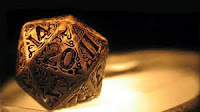
Then I found Robin Hobb and devoured the Farseer, Liveship Traders, and Tawny Man trilogies back to back. There was one Christmas where my family barely saw me because they kept distracting me from Fitz's adventures. What Hobb's books taught me was that fantasy could be on a much more personal level. I couldn't help but get inside of Fitz's head and feel what he felt. From that moment on I knew my stories would be about the characters. The fate of the world might hang in the balance but I would write about how the pressure of trying to save it was affecting the inhabitants.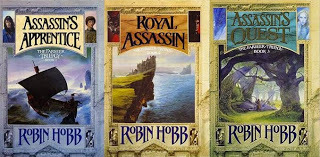 I laughed, I loved, and I cried over these books.
I laughed, I loved, and I cried over these books.
I got into World of Warcraft while studying Zoology at university. I find it hard to express just how much that game influenced me. Never have I been so absorbed into a world. Much of my time spent with it was grindingout experience or gold, but I also found myself intrigued by the lore. The conflict between races and nations, the idea behind the Emerald Dream, the scheming of the Dragons. I've long since left World of Warcraft behind but it definitely left its mark.
Just after finishing university I discovered the GrrM Reaper. Martin's A Song of Ice and Fire series is a true behemoth. I feel I learned two very important messages from Westeros. One was that twists could be truly shocking, and the other was that fantasy didn't have to be about the magic. Also, do not engage in food porn while creating literature. Too many pies can make books fat as well.
By now First Earth was taking shape in my head. I had a grand conflict in mind that would span a number of smaller stories as pieces were put into play by both sides. The Ties that Bind had yet to appear but a number of the characters were floating around in my head just waiting for a story of their own.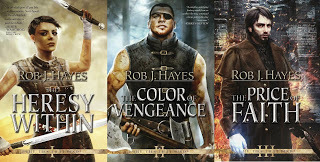 These characters existed long before their story.
These characters existed long before their story.
I'd be remiss if I didn't mention Chris Wooding's Tales of the Ketty Jay series. With fun dialogue, a gallery of rogues, and “blink and you'll miss it” pacing there are few (if any) series I have enjoyed reading quite so much, and those are elements I hope to emulate in my own work.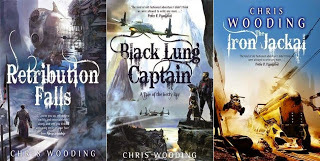 I'd be amazed if Wooding wasn't influenced by Firefly... but he kind of does it better.
I'd be amazed if Wooding wasn't influenced by Firefly... but he kind of does it better.
This isn't a complete list of course. I couldn't provide a complete list even if I spent the next year trying to remember every thing that has influenced and inspired me (especially as the list is constantly growing). I watch something on TV and it sets my imagination on fire, ideas spinning out of nowhere to change the worlds in which I write. I read a book and some of the concepts presented within its pages make me wonder at the ingenuity of the author and inspire elements of my own work. I hear dialogue so witty and real that I wonder why none of my characters say similar things. Inspiration comes from everywhere and it's impossible not to be influenced by the things we watch/read/see/do/love/fear.
So I tried telling all of this to the person who originally asked me this question and it's fair to say he looked a little bemused at my passionate outburst. After a moment of nodding along to the insanity clearly spilling out of my mouth, he finished fixing the boiler, asked for my autograph on the work order, and promptly drove away.
Rob J. Hayes is the author of the acclaimed The Ties that Bind trilogy. Find out more on his website here.
I've always been a dreamer. At school I was that child who spent more time staring out the window than at a text book, and I still spend a lot of time staring out of windows (some real, some metaphorical). I watched films and TV shows, I read books (mostly fantasy and sci-fi), I played games (computer games, board/tabletop games), I ran around the forest with my friends pretending sticks were swords. It's all pretty standard as far as childhoods go, I guess.
When I was 13 or 14 I read a book series called The Artefacts of Power by Maggie Furey. I was blown away by the scope of the story, the depth of the characters, and the majesty of the world. It inspired me to give this whole writing crack a go. What I created back then was truly awful and I thank the Gods (which ever will listen) that they are lost for all time.
 The series of a thousand covers.
The series of a thousand covers.I spent a fair few of my teenage years dreaming about a world of vampires, werewolves, demons, and angels. A lot of this was probably down to my watching of Buffy and its spin off Angel. I'd like to stop right here and say a big “Thank you” to Joss Whedon for teaching me that dialogue can be a lot of fun.
Eventually my dreams moved on again as I gravitated back towards a more traditional fantasy setting. Dungeons & Dragons was a big inspiration to me. I played it both with dice and bestiaries, and on the computer. For a long time I dreamed of a world bathed in magic and mythical creatures with plots that held the fate of a hundred worlds in the balance.

Then I found Robin Hobb and devoured the Farseer, Liveship Traders, and Tawny Man trilogies back to back. There was one Christmas where my family barely saw me because they kept distracting me from Fitz's adventures. What Hobb's books taught me was that fantasy could be on a much more personal level. I couldn't help but get inside of Fitz's head and feel what he felt. From that moment on I knew my stories would be about the characters. The fate of the world might hang in the balance but I would write about how the pressure of trying to save it was affecting the inhabitants.
 I laughed, I loved, and I cried over these books.
I laughed, I loved, and I cried over these books.I got into World of Warcraft while studying Zoology at university. I find it hard to express just how much that game influenced me. Never have I been so absorbed into a world. Much of my time spent with it was grindingout experience or gold, but I also found myself intrigued by the lore. The conflict between races and nations, the idea behind the Emerald Dream, the scheming of the Dragons. I've long since left World of Warcraft behind but it definitely left its mark.
Just after finishing university I discovered the GrrM Reaper. Martin's A Song of Ice and Fire series is a true behemoth. I feel I learned two very important messages from Westeros. One was that twists could be truly shocking, and the other was that fantasy didn't have to be about the magic. Also, do not engage in food porn while creating literature. Too many pies can make books fat as well.
By now First Earth was taking shape in my head. I had a grand conflict in mind that would span a number of smaller stories as pieces were put into play by both sides. The Ties that Bind had yet to appear but a number of the characters were floating around in my head just waiting for a story of their own.
 These characters existed long before their story.
These characters existed long before their story.I'd be remiss if I didn't mention Chris Wooding's Tales of the Ketty Jay series. With fun dialogue, a gallery of rogues, and “blink and you'll miss it” pacing there are few (if any) series I have enjoyed reading quite so much, and those are elements I hope to emulate in my own work.
 I'd be amazed if Wooding wasn't influenced by Firefly... but he kind of does it better.
I'd be amazed if Wooding wasn't influenced by Firefly... but he kind of does it better.This isn't a complete list of course. I couldn't provide a complete list even if I spent the next year trying to remember every thing that has influenced and inspired me (especially as the list is constantly growing). I watch something on TV and it sets my imagination on fire, ideas spinning out of nowhere to change the worlds in which I write. I read a book and some of the concepts presented within its pages make me wonder at the ingenuity of the author and inspire elements of my own work. I hear dialogue so witty and real that I wonder why none of my characters say similar things. Inspiration comes from everywhere and it's impossible not to be influenced by the things we watch/read/see/do/love/fear.
So I tried telling all of this to the person who originally asked me this question and it's fair to say he looked a little bemused at my passionate outburst. After a moment of nodding along to the insanity clearly spilling out of my mouth, he finished fixing the boiler, asked for my autograph on the work order, and promptly drove away.
Rob J. Hayes is the author of the acclaimed The Ties that Bind trilogy. Find out more on his website here.
Published on May 05, 2015 02:55
April 14, 2015
I hate Dany
There. I've said it. I'll say it again. I hate Daenarys Targaryen. I might be alone in this, I know many people who disagree with me, but damn does it feel good to say it. I hate Dany.
Now I love A Song of Ice and Fire (AsoIaF) and A Game of Thrones (AGoT) is more than a little watchable, but I'm honestly sick of people telling me how awesome Dany is. Here's why:
The Mother of Dragons started off as a really endearing, engaging character. From the moment she was introduced with her whiny brother, Viserys, all the way through her rise to power in the first book/season. She ate a horse heart, she rutted with Drogo under the stars, she took her dragon eggs into the pyre of her dead husband only to came out the other side unburnt. That was all very cool. I loved all that.
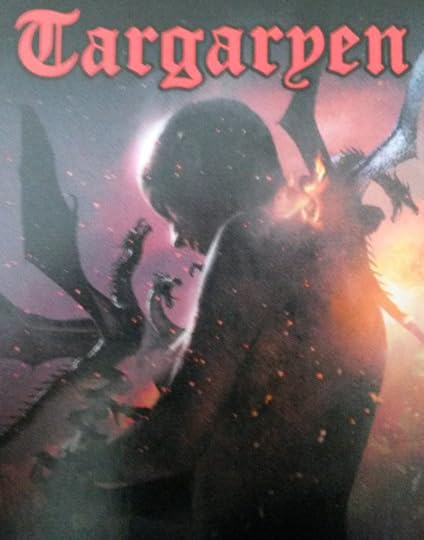 Wish I could find who this one belongs to.
Wish I could find who this one belongs to.
Ever since A Clash of Kings/season 2, she has done nothing but make the most stupid decisions possible. This is where she drives me insane with the hate. Little Miss Stormborne has a host of advisors throughout AsoIaF who tell her she should do this or that. Some of the advice is good, some of it is bad. Dany is a queen who listens to her advisers... then she identifies the best possible solution to the situation she faces (often one of her own making due to past idiotic decisions), and actively pursues the worst possible solution. THEN she has the audacity to be surprised when it all blows up in her face. Why does she have advisers if she never actually takes any of their advice?
Lets look at good ol' Barristan Selmy (Whitebeard). Barristan saves the Khaleesi on more than one occasion and is about as loyal as loyalty comes (without the whole wanting to get in her pants thing... Jorah!). I actually cannot remember one time where Dany listens to Barristan's advice and, honestly, she'd probably be back in Westeros with her arse polishing the Iron Throne by now if she had.
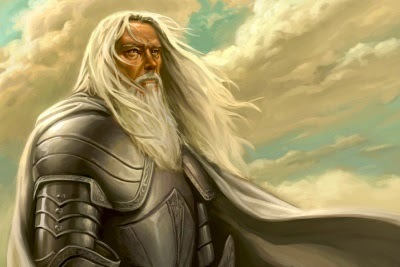 Barristan Selmy by Mike Capprotti
Barristan Selmy by Mike Capprotti
Now I know she's depicted as a flawed character who is not omnipotent and makes mistakes but... really, the point is to LEARN from your mistakes, not make even bigger ones. So this is the biggest problem I have with her. She makes mistakes, actively pursues idiotic solutions to her problems, refuses to learn from her mistakes, and NEVER ONCE does she hold up her hands and say: “My bad. That went pear-shaped and it's all on me.”
So this is it in a nutshell: I hate you Daenerys Targaryen. On the up side, I guess even in my hate I'm still engaged in the character's future in the story being told. Well done Mr Martin. All hail the GrrM Reaper.
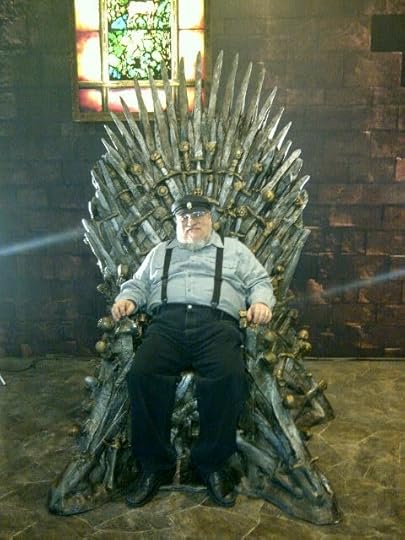 The GrrM Reaper on his throne.
The GrrM Reaper on his throne.
Now I love A Song of Ice and Fire (AsoIaF) and A Game of Thrones (AGoT) is more than a little watchable, but I'm honestly sick of people telling me how awesome Dany is. Here's why:
The Mother of Dragons started off as a really endearing, engaging character. From the moment she was introduced with her whiny brother, Viserys, all the way through her rise to power in the first book/season. She ate a horse heart, she rutted with Drogo under the stars, she took her dragon eggs into the pyre of her dead husband only to came out the other side unburnt. That was all very cool. I loved all that.
 Wish I could find who this one belongs to.
Wish I could find who this one belongs to.Ever since A Clash of Kings/season 2, she has done nothing but make the most stupid decisions possible. This is where she drives me insane with the hate. Little Miss Stormborne has a host of advisors throughout AsoIaF who tell her she should do this or that. Some of the advice is good, some of it is bad. Dany is a queen who listens to her advisers... then she identifies the best possible solution to the situation she faces (often one of her own making due to past idiotic decisions), and actively pursues the worst possible solution. THEN she has the audacity to be surprised when it all blows up in her face. Why does she have advisers if she never actually takes any of their advice?
Lets look at good ol' Barristan Selmy (Whitebeard). Barristan saves the Khaleesi on more than one occasion and is about as loyal as loyalty comes (without the whole wanting to get in her pants thing... Jorah!). I actually cannot remember one time where Dany listens to Barristan's advice and, honestly, she'd probably be back in Westeros with her arse polishing the Iron Throne by now if she had.
 Barristan Selmy by Mike Capprotti
Barristan Selmy by Mike CapprottiNow I know she's depicted as a flawed character who is not omnipotent and makes mistakes but... really, the point is to LEARN from your mistakes, not make even bigger ones. So this is the biggest problem I have with her. She makes mistakes, actively pursues idiotic solutions to her problems, refuses to learn from her mistakes, and NEVER ONCE does she hold up her hands and say: “My bad. That went pear-shaped and it's all on me.”
So this is it in a nutshell: I hate you Daenerys Targaryen. On the up side, I guess even in my hate I'm still engaged in the character's future in the story being told. Well done Mr Martin. All hail the GrrM Reaper.
 The GrrM Reaper on his throne.
The GrrM Reaper on his throne.
Published on April 14, 2015 08:03
March 27, 2015
Attack on Titan – An HONEST review (contains spoilers)

OK, I feel I need to go on a bit of a rant here. Almost everyone I know goes all dewy-eyed and moist at the mere mention of Attack on Titan (AoT), whereas I get infuriated. I feel you all need to know why so you can tell me how I'm wrong.
I'll start with a broad statement designed to raise the ire of my opposition. Attack on Titan was shit.

Now I've got you all good and steamed up I'll confuse you a little by saying some good things about it. The hook is brilliant. I watched all 25 episodes of season 1 of AoT and the only thing that kept me coming back (besides my own dogged perseverance) was the mystery of what the Titans actually were? Where they came from? And what was their agenda? None of those questions were answered by the end of season 1 and that left me with a bitter taste in my mouth because I really don't want to have to sit through a season 2.
The pacing was good. Stop. The pacing was good for the first 13 episodes. The story zips along with some twists and turns (not many but enough to count as a small chicane) and then it stops. Episodes 14-25 are a SLOG but I'll get to this in a moment.
I've run out of good things... honestly that's all I've got. It's not a big list is it? On to the bad!
The characters in AoT are awful. Let's start with the main character, Eren Jaeger (given that he turns into a Titan himself I'm forced to wonder if this is a little nod to Pacific Rim... if so then I'll put that in the good column because... well... Pacific Rim!). Now I like to refer to Eren as Shouty McShoutsAtEVERYTHING because that does seem to be his primary mode of communication. He shouts at his parents, he shouts at his friends, he shouts at his enemies, he shouts as his superiors, he even shouts at himself. Hell, he even shouts in his internal monologues. Honestly I get he's supposed to be passionate but you can get across passion without raising your voice. He feels a little like Steve Carrel's character in Anchorman.
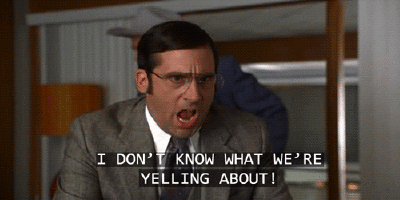
But Shouty is also something else. Shouty is also bland. He looks like every other anime teenager protagonist. He has no discernible character traits other than being angry all the time and wanting to kill ALL the Titans. I get that they're basically man-eating giants but surely they count as a separate species? I find it hard to get behind a characters whose main driving force is committing genocide.
I could go on but I'd like to get around to a couple of other characters. Next we have Mikasa Ackerman, Eren's adopted sister, and all round death dealing machine. Now Mikasa started off as interesting, sure she had the cliched silent, stoic femme fatal thing going on, but I could get past it because honestly she seemed like a much deeper character than Eren and she didn't go around screaming at everything. There was even a point (a couple of episodes) where it looked like she was set to be the main character and the whole following Eren Jaeger around thing was a ruse set down to build Mikasa's character. At this point I was ready to get behind the series in a big way... then Eren resurrected as a Titan and Mikasa went back to following him around making dewy eyes at him and being a bit wet. She never really moved past that point unfortunately.
The last of the three notable characters is Quatre Raberba Winnersorry I meant Armin Arlert (this will likely not be my only Gundam Wing reference). Armin is short, blond, a bit of a wuss, slightly effeminate, mentally unstable, and a strategic genius. He is actually a cut and paste model of Quatre and there is really very little else to say.


Moving on to a bit of the pacing of the second half of season 1. It's atrocious. Honestly there are episodes where nothing happens. I haven't seen pacing in anime this poor since I last watched a Naruto filler episode where they spent 10 mins recapping the last episode (where nothing happened) and then 10 mins of telling us what they're going to do in the next episode (pretty much nothing again).
The poor pacing culminated for me in episode 19 when we saw Eren astride a horse, with his hand in his mouth like a naughty child who was clearly about to do something despite being told not to. Then every one of the red shirts in his squad spent 5 minutes droning on about how Eren should trust them (yes, Eren spends this entire time with his hand in his mouth about to bite down to turn himself into a Titan). Predictably each and every one of those red shirts dies in the next episode. Oh well, hard to get attached to a character when all they are is a hair style.
 Special Operations Squad: Personalities are interchangeable but hairstyles are not!
Special Operations Squad: Personalities are interchangeable but hairstyles are not!There are other instances of poor pacing, such as an episode which literally just describes what the plan is for the next episode, but we'll drop it there instead of droning on. The last thing I want to do is become a parody of an AoT character.
I think it's important to touch upon a theme of AoT and that theme is: War is Hell. That's fair and I suppose it gets across the seeing of friends killed on the battlefield in horrific ways quite well. The problem is gets bogged down by it. AoT is not the first anime to support this theme, mecha animes have been doing it for years. Gundam Wing did it brilliantly, considering the entire plot of the series was actually about war being hell, and Treize and Zechs realising that the only way to end humanity warring was to give them a war that could never be allowed to be repeated (and you all thought it was about kids in big mechs). Even Eureka 7 touched on the war being hell when Renton realised he was killing people not just big robots. The important thing to note is that neither Gundam Wing, nor Eureka 7 got bogged down in the theme and neither wallowed in it like an elephant in a pool of mud.
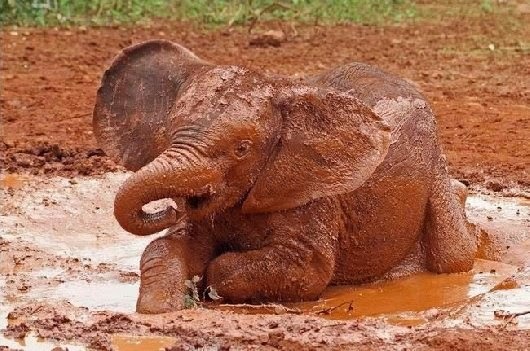
The other problem I find with the AoT War is Hell theme is that the characters take it SO hard when one of their comrades dies. Now I'm not trying to belittle how hard it hits when this REALLY happens but instead point out that AoT is set over 100 years after the Titans first appeared. Every character in AoT has grown up in a world where the threat of Titan attack is a real, constant possibility and yet none of them seemed prepared for it. It seems a little unrealistic to me. I'm not saying they should shrug it off like a scarf, but they join the military knowing full well what they're up against and none of them seem to expect to lose a single comrade.
One last thing I would like to point out is simply this: To defend against the Titans, 50 metre high walls were built around an area where the last of humanity is located (that's pretty much the premise for AoT). With a quick look at statistics I found that the area inside the walls is approximately the size of present day Germany. So, without the use of modern day equipment like cranes and heavy transport auto-mobiles, the people of this world somehow managed to construct a 50 metre high wall running approximately 480km, and then build 2 further circular walls inside of that one.

So there we have it, my honest review of Attack on Titan season 1. Does anyone agree? I welcome all comments from thoughtful retrospectives to enraged, flaming fan boys spewing hate.
Published on March 27, 2015 05:39
January 26, 2015
Adventures in Publishing – the Danger of Switching Genres
Once upon a time I wrote a little fantasy trilogy called The Ties that Bind (TTtB). This story I penned did quite well. It sold a lot of copies, it got a lot of attention, and for a while it even hung around in the top spot with the big boys (there was a point where only GRRM kept me from the number 1 epic fantasy spot on Kindle).
I received plenty of praise for my trilogy along with plenty of hate (and I do mean hate). Along with the comments of folk calling me one of their new favourite authors I received others calling me an Abercrombie clone; I was attacked with accusations of writing pornographic rape scenes; one email I received actually threatened me with bodily harm for the fate of their favourite character. While I received far more positive comments than negative, the negatives always seemed more vehement, always attacking me rather than my work. I'd be lying if I said that I haven't suffered from a few sofa days due to some of the negatives.
Towards the end of writing TTtB I had an idea for a very different story. This new tale would still be set in a fantasy world but one with a much lighter tone. Instead of grim bastards, psychopathic witch hunters, and murderous whores; this new story would have wise-cracking thieves, duplicitous aristocrats, airships, and loveable Oozes.
After the success of TTtB I took my writing career full time. I knuckled down and, despite the many calls for a follow up to my debut trilogy, I wrote a stand alone novel set in this new, lighter world. I called the book The Northern Sunrise (TNS) and released it into the world with high hopes. TNS, while still fantasy, had a very steampunk feel to it (I like to call it Alchemypunk); it was definitely a change of genre. I did not use a pseudonym because I felt my name was known to some and it may help sales (also I'm a bit narcissistic and I love seeing my name on things). This was apparently a mistake.
To date, the majority of negative reviews (and there haven't been all that many) have not been because of the story, or plot, or characters, or world, or even the writing; they have been because it was not more of TTtB. It seems many of my readers who enjoyed my trilogy expected TNS to be more of the grim, dirty, sordid feel. I actually received an email from one person who claimed I had tricked them into buying my new book simply by writing something so different.
I felt hurt. I know we authors shouldn't take negative reviews too much to heart (an early lesson for me was that I can't please everyone), but to have people who loved my debut trilogy slate the new book because it wasn't what they were expecting... well that knocked me down a peg or two. I didn't think I had tricked anyone, I had stated quite clearly that TNS was an entirely different type of book set in an entirely different world with an entirely different feel.
It took a while for me to pick myself back up after some of the comments I received but I did. I started writing a follow up to TTtB, not because it was what people wanted but because it was what I wanted. After finishing my debut trilogy I felt I needed a break from the darkness of that world and I had taken that break, but there was still a story to be told so I dove back in. I'd be lying if I said the experience hadn't taken a bit of shine away from the dream.
So what did I learn? Well before I would never have used a pseudonym but now... now I think I would have. Switching genres is a dangerous game because the fan base you build for one piece of work may not be interested in the new genre. I suppose I should actually feel grateful that, despite the negative comments, some of the fans I gained from writing TTtB liked my work so much that, even though I stated quite firmly that TNS was a different book, they were still willing to pick it up and give it a read.
I bring this up now because, after almost one year of release, I will soon be taking The Northern Sunrise down. I'm going to relaunch it with a new cover and a new title (I have been advised that neither are catchy enough). Whether or not I decide to relaunch it with a pseudonym, I will also state quite clearly that it is a relaunch of The Northern Sunrise because the last thing I want is to trick people into buying it twice.
Published on January 26, 2015 02:33
November 24, 2014
Dragon Age (without an) Inquisition
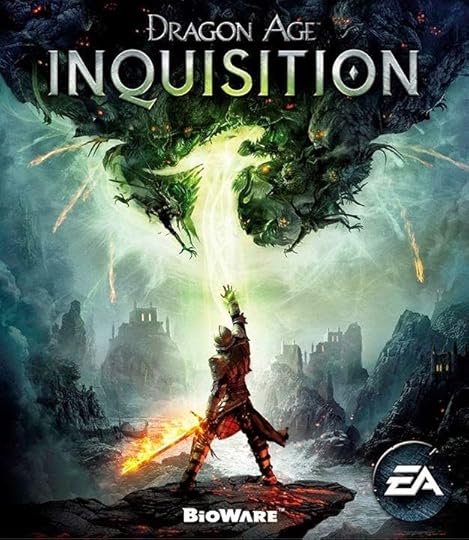
Having hacked my way through giant spiders and tiny velociraptors, my journey through the pitch black cave is finally at an end. I step out of the mouth and the light, though dim, blinds me for a moment and in that moment I feel the earth shake and a roar rips through the air deafening the storm that rages around the coast.
As my vision clears I see the rocks and pebbles of the beach still being battered by the unrelenting waves. Rain hammers down all around painting the world in grim grey hues and lightning flashes somewhere on the endless ocean horizon.
Something huge rushes into view, crossing from above the cliffs to my right and soaring down towards the ground. It passes behind some of the gargantuan pillars of rock that climb out of the sea floor and comes to land somewhere across the bay, shaking the ground as it touches down.
With reckless abandon and child-like grin on my face I charge across the stony beach, slipping on rocks and ignoring the grasping plants. I catch another glimpse of the mammoth beast and its head whips out, its teeth bared. It appears to be attacking something.
As I get closer I hear another roar, this one different from before; deeper but not as loud. I move around the last of the stone pillars and crouch down behind a fallen tree so the beasts don't see me and I look up to see a dragon, near filling my vision, trading blows with a tusked giant.
I forget myself and stand, my mouth hanging open at the sight of the spectacle, just as the giant lands a vicious blow to the dragon's head. The winged monstrosity shakes off the attack and launches into the air, flapping its giant wings and fleeing the battle. The giant bellows out a victory cheer and turns towards me, its beady eyes focusing on me...
Dramatic no?
So I've been playing Dragon Age Inquisition (DA:I) and I'm about 20 hours in (fairly impressive in just two days of play but helped by a near terminal case of man-flu... honest) and my first impressions are that I'm loving it. The grand spectacle of it is what's hitting me most at this point. The passage above actually happened! Yes I added a bit more flair to it but good games shouldn't spoon feed us everything, they should tell us where we are and what we're doing but our own imaginations should make the events more real and that's what DA:I is doing for me.
This wasn't actually my first encounter with a dragon in DA:I but the first was a bit different and can be summed up like this.
“Vicki, come and look and the screen. LOOK! A dragon. I just walked out here and it took off and... damnit now my face is on fire.”
It didn't go so well.
Anyway the game starts a bit slow, as most grand RPGs do these days. Choose character class, create character, watch a bunch of cinematics, set the scene, spend 30 minutes learning how to play the game despite already knowing that pushing up on the thumbstick will walk my character forward (don't you just love tutorials). The game doesn't take long in throwing you out into the first of its locations and it's an impressively big one. I've spent the majority of my 20 hours of gameplay in the first zone of the Hinterlands and I've still got plenty of quests to do and a fire-breathing dragon to bitch slap.

As with most games of the ilk you have the option of dancing to the developers' tune and following the story or spending hours upon hours gathering herbs and making potions... or gathering metals and making armour/weapons... or gathering... I'll stop. You pick up party additions quickly and most are instantly memorable though maybe not for the right reasons (I honestly can't understand one elven lass, her language is almost as bad as one my own characters).

The storyline... well only being 20 hours in it's hard to say for sure but: big hole in sky, out pours demons, some big bad wants to take over/enslave the world. Main character has to convince the inhabitants of the world to band together under an Inquisition to beat back the big bad. That's about all I've got so far and I've got a couple of issues:
First is that this is the plot from Mass Effect 3. If my character has to choose between a) sacrificing himself to save the world, b) sacrificing himself to save the world, or c) sacrificing himself to save the world at the end I will not be pleased.
Second is that I do believe they've misunderstood the point of an Inquisition. Historically the Inquisition (both in our world and the Dragon Age world) was a group of zealots given authoritative power by a religious institution to hunt down, question, and judge those who practice 'heretical' beliefs. In DA:I the Inquisition seems to be a bunch of folk brought together by a common enemy with the express purpose of saving the world. From now on I think I will call the game Dragon Age: Fellowship of the Ring.
 Cue dramatic landscape panning.
Cue dramatic landscape panning.But these issues aren't stopping me from having fun, from enjoying the game, from wanting to drop my editing in the 'to do' list and jump back on it, and from trying to sex up as many of the characters as possible (anyone who has ever played a Dragon Age or Mass Effect game will get what I mean).
The grandeur of the game is undeniable. It's beautiful from sunlit rolling fields and mountains, to storm-ravaged coasts, to sparsely populated cities where nobody ever moves more than a few feet (one day games devs will get cities right). And it's wonderful to see dragons done well for a change. I loved Skyrim but when I can kill a dragon with 2 arrows and then scoff down its soul... it just doesn't really feel like a dragon to me. They need to be huge and powerful and I should run in terror when I see one.
 This is how soul eating should look.
This is how soul eating should look.So 20 hours in and I can highly recommend DA:FotR. It's fun, it's grand, and it's so steeped in lore and back story that you can spend hours just learning about the governmental politicking of Tevinter, trust me.
Oh and my character is wearing this hat!

Published on November 24, 2014 08:19

